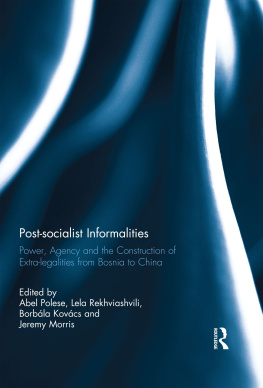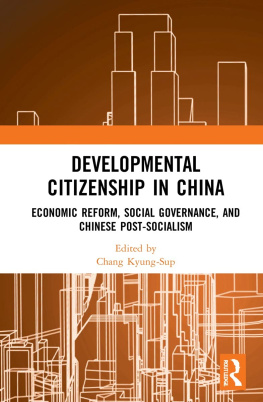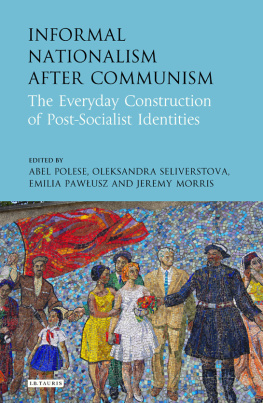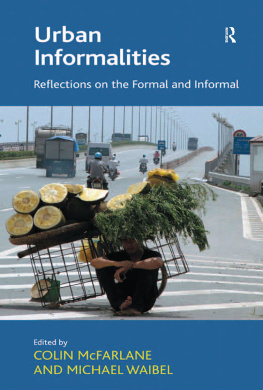Post-socialist Informalities
This book is a comprehensive collection of key scholarship on informality from the whole post-socialist region. From Bosnia to Central Asia, passing through Russia and Azerbaijan, the contributions to this volume illustrate the multi-faceted and complex nature of informality, while demonstrating the growing scholarly and policy debates that have developed around the understanding of informality.
In contrast to approaches which tend to classify informality as bad or transitional meaning that modernity will make it disappear this edited volume concentrates on dynamics and mechanisms to understand and explain informality, while also debating its relationship with the market and society.
The authors seek to explain informality beyond a mere monetaristic/economistic approach, rediscovering its interconnection with social phenomena to propose a more holistic interpretation of the meaning of informality and its influence in various spheres of life.
They do this by exploring the evolving role of informal practices in the post-socialist region, and by focusing on informality as a social organisation determinant but also looking at the way it reshapes emergent social resistance against symbolic and real political order(s).
This book was originally published as two special issues of Caucasus Survey and the Journal of Contemporary Central and Eastern Europe.
Abel Polese works on governance and informality with focus on Eastern Europe, the Caucasus, Central and Southeast Asia. He is affiliated to Dublin City Universitys Institute for International Conflict Resolution and Reconstruction and Tallinn University of Technologys Tallinn Law School and Tallinn Universitys RASI.
Lela Rekhviashvili works on informal economic practices, political economy of development, and mobility studies. She is based at the Leibniz Institute for Regional Geography, Germany.
Borbla Kovcs is based in the Department of Political Science at Central European University, Hungary.
Jeremy Morris is an ethnographer of post-socialism, and the author and editor of numerous books. He is based at the University of Aarhus, Denmark.
Post-socialist Informalities
Power, Agency and the Construction of Extra-legalities from Bosnia to China
Edited by
Abel Polese, Lela Rekhviashvili, Borbla Kovcs and Jeremy Morris
First published 2018
by Routledge
2 Park Square, Milton Park, Abingdon, Oxon, OX14 4RN, UK
and by Routledge
711 Third Avenue, New York, NY 10017, USA
Routledge is an imprint of the Taylor & Francis Group, an informa business
2018 Taylor & Francis
All rights reserved. No part of this book may be reprinted or reproduced or utilised in any form or by any electronic, mechanical, or other means, now known or hereafter invented, including photocopying and recording, or in any information storage or retrieval system, without permission in writing from the publishers.
Trademark notice: Product or corporate names may be trademarks or registered trademarks, and are used only for identification and explanation without intent to infringe.
British Library Cataloguing in Publication Data
A catalogue record for this book is available from the British Library
ISBN 13: 978-1-138-29622-0
Typeset in Myriad Pro
by RefineCatch Limited, Bungay, Suffolk
Publishers Note
The publisher accepts responsibility for any inconsistencies that may have arisen during the conversion of this book from journal articles to book chapters, namely the possible inclusion of journal terminology.
Disclaimer
Every effort has been made to contact copyright holders for their permission to reprint material in this book. The publishers would be grateful to hear from any copyright holder who is not here acknowledged and will undertake to rectify any errors or omissions in future editions of this book.
Contents
Citation Information
The chapters below were originally published in the Journal of Contemporary Central and Eastern Europe, volume 24, issue 3 (December 2016). When citing this material, please use the original page numbering for each article, as follows:
Chapter 1
States of informality in post-socialist Europe (and beyond)
Abel Polese, Jeremy Morris and Borbala Kovcs
Journal of Contemporary Central and Eastern Europe, volume 24, issue 3 (December 2016), pp. 181190
Chapter 2
Informality currencies: a tale of Misha, his brigada and informal practices among Uzbek labour migrants in Russia
Rustamjon Urinboyev and Abel Polese
Journal of Contemporary Central and Eastern Europe, volume 24, issue 3 (December 2016), pp. 191206
Chapter 3
End to informality? Examining the impact of institutional reforms on informal institutions in post-Euromaidan Ukraine
Huseyn Aliyev
Journal of Contemporary Central and Eastern Europe, volume 24, issue 3 (December 2016), pp. 207222
Chapter 4
Informality as an interpretive filter: translating ubleha in local community development in Bosnia
Karla Koutkova
Journal of Contemporary Central and Eastern Europe, volume 24, issue 3 (December 2016), pp. 223238
Chapter 5
Socio-economic deficits and informal domestic childcare services in Romania: the policy drivers of the commodification of care from a micro-level perspective
Borbla Kovcs
Journal of Contemporary Central and Eastern Europe, volume 24, issue 3 (December 2016), pp. 239254
Chapter 6
Counterbalancing marketization informally: Georgias new-institutionalist reform and its discontents
Lela Rekhviashvili
Journal of Contemporary Central and Eastern Europe, volume 24, issue 3 (December 2016), pp. 255272
Chapter 7
Regional security governance in the former Soviet space? Researching institutions, actors and practices
Alessandra Russo
Journal of Contemporary Central and Eastern Europe, volume 24, issue 3 (December 2016), pp. 273292
Chapter 8
The art of not seeing like a state. On the ideology of informality
Rune Steenberg
Journal of Contemporary Central and Eastern Europe, volume 24, issue 3 (December 2016), pp. 293306
Chapter 9
Accomplishing public secrecy: non-monetary informal practices and their concealment at the emergency department
Marius Wamsiedel
Journal of Contemporary Central and Eastern Europe, volume 24, issue 3 (December 2016), pp. 307320
Chapter 10
Evaluating the multifarious motives for acquiring goods and services from the informal sector in Central and Eastern Europe
Colin C. Williams and Ioana A. Horodnic
Journal of Contemporary Central and Eastern Europe, volume 24, issue 3 (December 2016), pp. 321337
The chapters below were originally published in Caucasus Survey, volume 5, issue 1 (March 2017). When citing this material, please use the original page numbering for each article, as follows:
Chapter 11
Introduction: Informality and power in the South Caucasus
Abel Polese and Lela Rekhviashvili
Caucasus Survey, volume 5, issue 1 (March 2017), pp. 110












